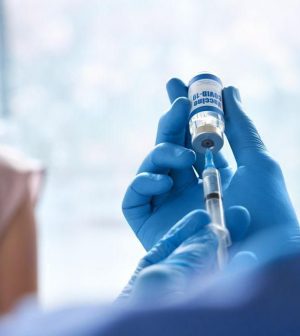- Could Artificial Sweeteners Be Aging the Brain Faster?
- Techniques for Soothing Your Nervous System
- Does the Water in Your House Smell Funny? Here’s Why
- Can a Daily Dose of Apple Cider Vinegar Actually Aid Weight Loss?
- 6 Health Beverages That Can Actually Spike Your Blood Sugar
- Treatment Options for Social Anxiety Disorder
- Understanding the Connection Between Anxiety and Depression
- How Daily Prunes Can Influence Cholesterol and Inflammation
- When to Take B12 for Better Absorption and Energy
- Epsom Salts: Health Benefits and Uses
Moderna Asks FDA to Approve Second Booster for All Adults

Moderna said late Thursday that it has asked the U.S. Food and Drug Administration to approve the emergency use of a second booster of its COVID vaccine for all adults.
In a statement, the company noted its request is based partly on recent data from the United States and Israel showing how well its vaccine protects against the Omicron variant.
Moderna has asked for much broader authorization for a second booster than Pfizer did when it requested FDA emergency use authorization of a second booster of its vaccine for adults 65 and older earlier this week. In doing so, Moderna explained that its request covered all adults to give federal health officials the freedom to determine who should get a second booster, including for those at higher risk of severe disease because of age or underlying medical conditions.
U.S. health officials have expressed concerns about the waning power of Moderna and Pfizer booster shots that were authorized last fall. There are signs the FDA could respond quickly to Pfizer’s request for a second booster, but it’s unclear how the agency will view Moderna’s request, The New York Times reported.
In the meantime, experts are engaged in an intense debate over whether a second booster is needed at the moment.
“I’m a strong proponent of giving a second booster now,” Dr. Peter Hotez, a vaccine expert at the Baylor College of Medicine in Houston, told the Times.
The first booster shot “made a huge difference” in improving protection against hospitalization and even infection from the Omicron variant, Hotez noted.
“It’s also clear that protection is waning now pretty quickly, a few months after your third dose,” he said. “So, it’s short-lived. The hope is that a second booster would restore it.”
But there are still a number of questions that need to be answered before approving second boosters, according to Dr. Jesse Goodman, a former chief scientist for the FDA.
“While protection is waning against mild infections, without more information we do not yet know to what extent, if any, protection is waning against severe disease,” he told the Times.
It’s also not clear “to what degree and for how long another booster might help,” Goodman added.
A U.S. Centers for Disease Control and Prevention study released last month said the protection of the Pfizer and Moderna vaccines against hospitalization fell from 91% two months after a booster shot to 78% after four months, but that research did not break down hospitalizations by factors such as age or the presence of underlying conditions, the Times reported.
More information
Visit the U.S. Centers for Disease Control and Prevention for more on COVID boosters.
Source: HealthDay
Copyright © 2026 HealthDay. All rights reserved.










